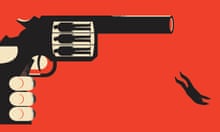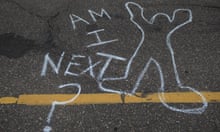Before Barack Obama went to bed in the early hours of Friday – he had just arrived in Poland for a Nato summit – he delivered a statement about two fatal shootings this week by the police that were caught on video, heightening racial tensions. When the president woke, he had to deliver another statement, about five policemen shot dead in Dallas, Texas. Such is the alarming and dangerous speed of events in America as it confronts some of the most racially charged incidents for decades.
In the years after the civil rights movement of the 1950s and 60s, race in the US dropped down the news agenda, at home and abroad. But the changes won in legislation and court rulings were not matched by conditions on the ground. There were improvements for some in education and employment, but life was not visibly different for the bulk of the African-American and Latino populations. In too many major cities, segregation remained a reality. Even the capital, Washington DC, where politicians spoke grandly of freedom, equality and tolerance, remained deeply divided. It is America’s dirty little secret.
Race went back on to the news agenda in 2013 with George Zimmerman’s acquittal over the fatal shooting of the African-American teenager Trayvon Martin, and it has stayed there ever since. The police shooting of Michael Brown was followed by the deaths of other unarmed black Americans in encounters with the police. There was the appalling shooting of nine black parishioners in a church in Charleston, South Carolina. And this week the police shootings of Alton Sterling and Philando Castile; and on Friday five policemen shot dead by sniper fire, with a suspect reportedly saying he was upset about recent shootings and wanted to kill white officers.
Such cases risk inflaming racial tensions, with no end in sight until America tackles the underlying causes. It is a terrifyingly huge challenge, dodged for too long. First, there is the segregation in the cities. Second, vast inequality: in Detroit, 10% of white people live in poverty but 33% of black people. And third, the country’s stubborn attachment to guns.
President Obama, in his statement about deaths at the hands of the police, cited statistics showing minorities are more likely to be pulled over, searched or shot by officers. It was incumbent on the country to root out deep-seated racial biases, he said. Last month’s Pew Centre survey on attitudes towards race in the US highlights the gulf in views. It found 88% of blacks said the country needed to continue making changes for blacks to have equal rights with whites, with 43% sceptical that such changes would ever occur. Only 53% of whites said the US still had work to do and only 11% expressed such scepticism.
A White House led by Hillary Clinton offers a better chance of at least attempting change than one led by Donald Trump. The question is whether, against a backdrop of austerity, she has the courage to devote the billions that would be needed to make a start in addressing inequality. On guns, she has been surprisingly outspoken in saying that as president she would seek reforms. There is scope for some restrictions short of the kind of sweeping changes that happened in the UK after the Dunblane school massacre. There could be tighter checks on gun ownership, a campaign to replace the unbending leadership of the National Rifle Association and a ban on powerful automatic weapons. Why did anyone need such guns, President Obama asked on Friday.
In his late-night statement, he referred to the Black Lives Matter campaign in words that seemed prescient next day: “When people say ‘black lives matter’, it doesn’t mean that blue lives don’t matter. But right now, the data shows that black folks are more vulnerable to these kinds of incidents.”
The imperative for America is to transform that “data”, tackle problems shamefully ignored after the civil rights movement and try finally to end a centuries-old racial divide.









